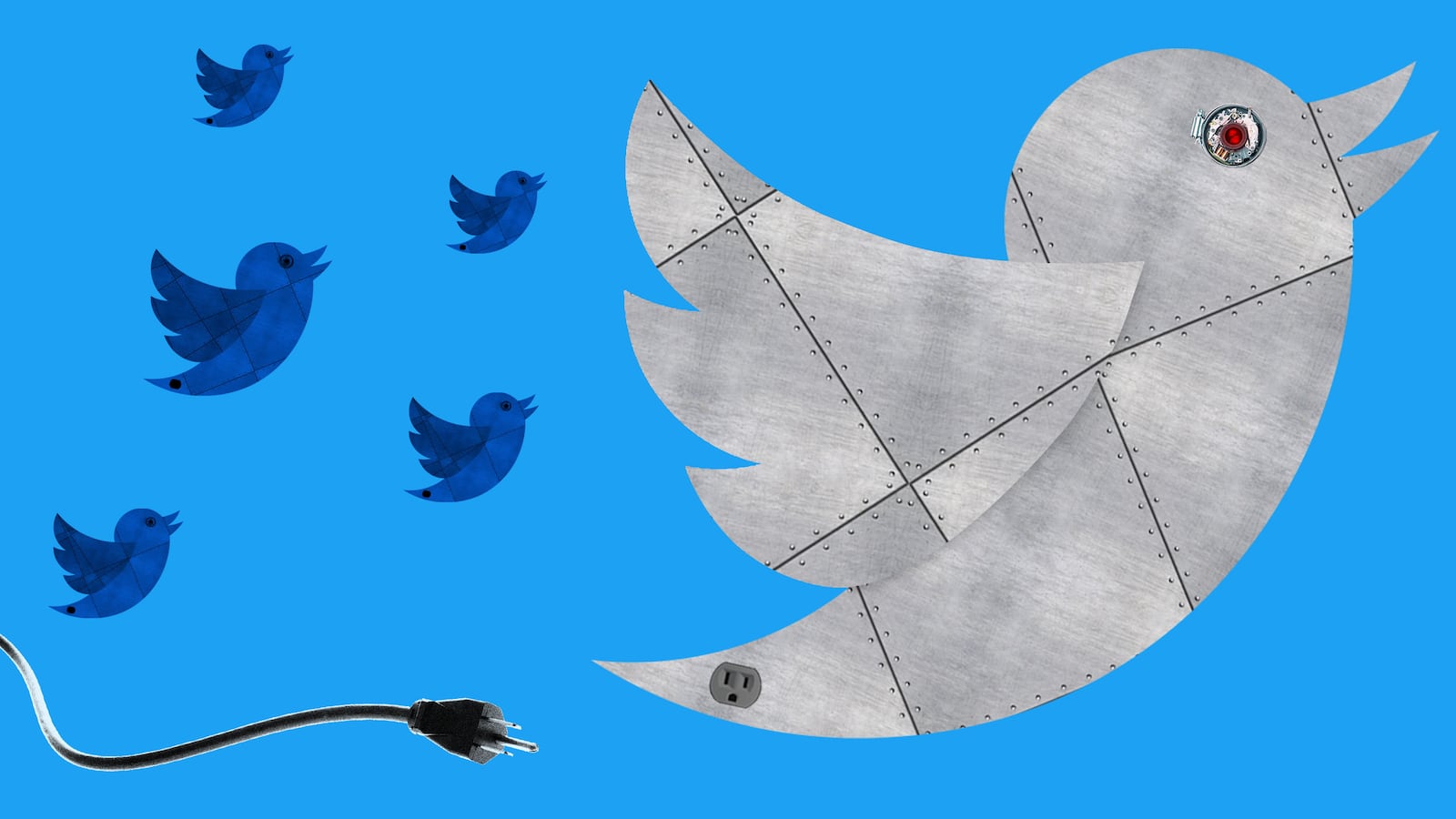Over the past 24 hours, Twitter suddenly deleted thousands of accounts as part of a massive crackdown on automated bots on the platform.
The pulldown took place quite literally in the middle of the night, without warning or explanation from the company.
Leading right-wing trolls and conspiracy theorists, many of whom woke up this morning to discover that their follower numbers had plunged by the thousands, kicked off and outrage cycle, accusing Twitter of censorship, violating their free speech, and unfairly punishing conservatives.
Right-wing agitators and white supremacists including Michael Flynn Jr., Richard Spencer, Cassandra Fairbanks, and Infowars editor Paul Joseph Watson all complained about losing thousands of followers. Other conservative users and their supporters have begun using the hashtag #TwitterLockOut to voice their anger on the issue.
“If you lost followers during the #TwitterLockOut, comment below. Follow each other & use this as an opportunity to grow stronger. The people, united, will never be divided,” one verified troll tweeted.
Conservative writer Mark Pantano and others complained on Wednesday that they were unfairly targeted in Twitter’s recent clean up and forced to verify their identity through two step authentication. Other users had their ability to run ads revoked.
NRA TV host Dan Bongino tweeted, “That twitter attack on conservatives hit me too last night. I was deemed ‘ineligible’ to use twitter ads and had followers purged. Twitter should ashamed, we have to organize a response.”
Twitter, which did not return a request for comment, eventually published a blog post on Wednesday following the backlash. In it, the company outlines why and how the crackdown against bots is being enforced. The company said that the changes it’s making are focused on restricting people using bots to “artificially amplify or inflate the prominence of certain Tweets.”
“In January, we announced that as part of our Information Quality efforts we would be making changes… to limit the ability of users to perform coordinated actions across multiple accounts,” the post reads. “These changes are an important step in ensuring we stay ahead of malicious activity targeting the crucial conversations taking place on Twitter—including elections in the United States and around the world."
But while free speech advocates and former Twitter employees all agreed that the company should continue to be more open with the way it policies its platform, they had differing approaches to how they’d deal with the root of the issue.
One former senior engineer at Twitter said that while it’s crucial Twitter remain proactive and open about changes it’s making to its platform, revealing too much an attempt to appease angry conservatives could end up making it easier for hackers to build more sophisticated bots to skirt the rules.
“Twitter should not publish guidelines around what types of bots or accounts are being deleted,” he said. “They can’t be like, ‘Hey, here’s what we’re using to determine a bot,’ because then it becomes a cat and mouse game. If the cat publishes their plan, it’s over.”
Another former Twitter employee said that, while broad blog posts and announcements, such as the one issued today, are absolutely helpful, part of the reason Twitter may be remiss to publish that type of content preemptively may be because of how sloppy the company’s spam detection process truly is.
“The real problem for Twitter lies in its inability to properly detect and thwart these fake accounts. It’s likely the main reason why they won’t talk about what they’re doing. The team is just too understaffed and poorly built to handle such a large issue, and explaining their reasoning would lead to more outcry for accounts that haven’t been banned yet,” the employee said.
“I’m guessing they don’t want to shine too much light on their efforts. I’m sure they’d prefer to keep their heads down, avoid the press, and quietly try to clean up their mess.”
Getting too deeply into nitty, gritty details can also inflame political tensions.
Social media companies, including Facebook, have increasingly sparred with right-wing groups. In 2016 right-wing group accused Facebook of suppressing conservative views and promoting censorship. While Facebook admitted that Russian-backed accounts had purchased ads on its platform, it has yet to consistently alert the public to new findings.
This week, social blogging platform Medium suspended the accounts of three leading conservatives, Mike Cernovich, Jack Posobiec, and Laura Loomer, in an effort to limit those who promote “harassment, hate speech, violence, or disinformation.”
“The biggest challenge all social platforms face is that abuse, fake news, and bot accounts skew right, and Silicon Valley doesn’t want to be accused of liberal bias,” another former Twitter employee said. “If this crap skewed left, the companies could take it down in one fell swoop without any political concerns. But you can't do that now, because it will kick of a week long cycle about censoring conservatives on the internet.”
A former senior engineer at Twitter agreed that Twitter’s tip toeing around conservatives for fear of being labeled as biased probably ended up causing more drama than had they just addressed things clearly and directly to begin with.
“If the question is what is going to stop people bitching about Twitter, the answer is nothing. People are really ignorant when it comes to technology,” he said. “Twitter has a responsibility to communicate in a way that people understand what they’re doing. But I think this thing speaks more to our political climate than Twitter’s responsibility. This outrage reveals much more about the people who are outraged than Twitter.”
When Twitter doesn’t say why or how it's taking certain actions, users are left in the dark to speculate, and many will buy into conspiracy theories, like the notion that Twitter targets conservatives.
Sarah McLaughlin, a free speech advocate with the Foundation for Individual Rights in Education, said that “as a general rule, social media platforms are bad at transparency. Any act Twitter takes to remove accounts will look questionable if the company isn’t completely upfront about its reasons for doing so,” she said.
“I think it would benefit Twitter most if major moderation moves were explained before they were enacted,” she added. “Otherwise, in the absence of clear guidelines announced beforehand explaining the reasons accounts are being removed and the policies which they are violating, people will speculate, often wildly.”
Charles Duan, a free speech advocate and associate director of Technology and Innovation Policy at R Street Institute said that above all else, Twitter needs more proactive transparency.
While Twitter is a private company, unbeholden to the First Amendment, Duan believes it’s hypocritical for the company to hold itself up as a beacon of uncensored online discussion then make arbitrary changes or remove accounts with no explanation.
“There are situations where Twitter has taken advantage of its status as something of a public forum and I think that does give them a level of responsibility to think about their actions and internal motivations,” he said. “But ultimately it’s a matter of transparency. Private companies can act in the dark, but when they do that they’re rightfully criticized for not explaining their actions.”
Duan said that Twitter should announce things like mass bot deletion, but make a technical case for the change rather than trying to enforce guidelines around content.
For instance, he suggested that perhaps a blog post outlining how Twitter bots stress the company’s servers and cause technical difficulties might assuage user concerns without making them think that only bots with certain viewpoints were being attacked.
But even a thorough explanation of the actions the company is taking is unlikely to appease many on the right, who still feel like the company’s policies are being applied unfairly. And if this drama sounds familiar, it’s because it’s played out many times before.
In 2016, Twitter shut down several popular right-wing accounts and bots for abusing its @-reply function. After previous “purges,” many right leaning Twitter users and members of the alt-right fled to Twitter clone Gab, which is largely used and touted by the far-right fringe.
Federal Communications Commission Chairman Ajit Pai said last fall that he believes the company has a “double standard” for conservatives.
Twitter also angered people on the right back in November, when it revoked verified check marks from known white supremacists and Nazis on the platform, after doling them out just a week prior. White supremacists Richard Spencer and Charlottesville “Unite The Right” protest creator Jason Kessler both lost their check marks, which are used to verify the identity of public figures, but later came to serve as a status symbol on the platform.
Twitter, does have a set of community guidelines outlining what will and will not be tolerated on the platform. But its problems seem to come when it's time to enforce those guidelines.
Twitter, like Facebook and other social networks, has a long history of cracking down on certain groups or language while letting others slide.
The company found itself embroiled in weeks of criticism after it was forced to address Donald Trump’s tweets, many of which technically violate Twitter’s guidelines. Eventually, the company addressed the issue in a blog post about world leaders, claiming that deleting Trump’s account and holding him to the same standard of other users on the platform would “hide important information people should be able to see and debate.”
But half-hearted, posthumous explanations of why accounts were deleted, suspended, or stripped of certain privileges do nothing to instill confidence in users, particularly conservatives, who feel they've been unfairly targeted by the platform.
The latest cries of censorship are only valid if one believes strings of code simulating thousands of people have the same rights as a single person. But as long as Twitter continues to be so opaque about the way it policies its own platform, its relative silence will fuel the frenzy.






